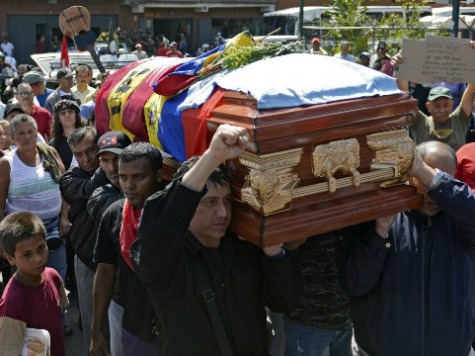In a country with one of the highest murder rates in the world, the availability of coffins is fundamental. In Venezuela, a nation suffering from shortages of everything from water to flour to toilet paper, citizens must now fear scarcity even in death, as coffin manufacturers announce a shortage.
UK newspaper The Guardian is reporting that products such as glue, varnish, and paint are increasingly scarce, and the wood material from which coffins are made has increased in price due to shortages. Overall, coffin production has dropped between 20% and 30% in 2014, the paper reports. Such a shortage has forced funeral homes and cemeteries to delay burials, causing families to wait longer for closure for their dead.
According to The Guardian, those in the coffin business in the country are blaming the socialist government of President Nicolás Maduro. The metal leaf used to make coffins is particularly scarce at the moment, a former president of the country’s funeral parlor association states. This is the result of the work of Sidor, Venezuela’s state-run foundry. “I figure that within two or three months, if things continue on this path, it’s going to get so bad that there won’t be coffins to bury people,” added executive Juan Carlos Fernandez of Ataudes Venezuela, one of the largest coffin companies in the nation.
The Associated Press reports that the coffin shortage has coincided with a 15% increase in demand for coffins, making it even more difficult to acquire a coffin in which to bury the dead. The increase can be attributed, in part, to the growing violence in Venezuela. A United Nations study announced this year that Venezuela has the second-highest murder rate in the world–second only to Honduras.
The coffin shortage is the latest in a series of scarcities that are plaguing Venezuela under the Maduro regime. The government has distributed ration cards in supermarkets to prevent Venezuelans from buying toilet paper, flour, vegetable oil, and milk, despite denying these shortages in 2013. It has also intervened in imports of paper, threatening to prevent daily newspapers from publishing. Many in the opposition denounced this as a tactic to keep papers from publishing the news. Last month, the Maduro regime announced that it would begin rationing water in the face of additional shortages.
The skyrocketing poverty in Venezuela has contributed to growing negative sentiment against both the Maduro government and socialism in general. According to a poll published by El Universal, Venezuela’s largest newspaper, when asked, 53.5% of Venezuelans say they disagree with socialism, an increase of six percentage points since February. Furthermore, 47.8% of respondents state that they believe Maduro’s “true intentions” to be the “establishing of a communist system.”

COMMENTS
Please let us know if you're having issues with commenting.